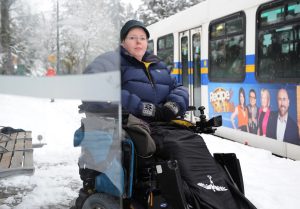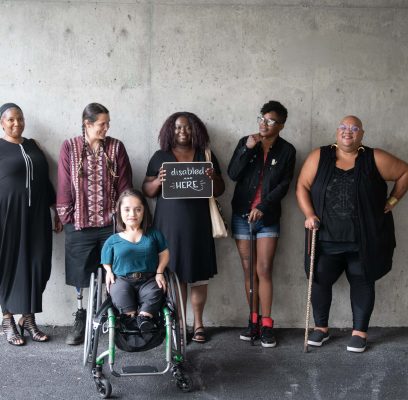CAN was founded out of the advocacy of our founding board and members and their experiences of living with a disability in a world that does not properly recognize, respect, or include them. Advocacy is the core of our origin story and continues to be a main focus in our 17 year history and present.
Following are some examples of topics of which Creating Accessible Neighbourhoods has advocated for and/or currently advocates for:
- Better living standards and increased disability amount for disabled people on provincial disability (as well as others living in poverty),
- For communities to recognize and better represent their diverse population.
- Affordable, equitable, and accessible transportation, and to
- Empower those whose voices are ignored, steamrolled, or pushed to the side.
- Improve accessibility.
- Promote the understanding that we will all need accessibility at some point in our lives.
- Educate about people with disabilities and our needs
- Advocate for the medical system to be more safe, culturally respectful, accessible, and less ableist, classist, racist, etc.
CAN is a passionate advocate whose work covers many sectors: organizations, businesses, cities, individuals and government. We also have experience using the media to bring attention to issues.
Below are examples of some of the ways we advocate for people with disabilities and their intersecting identities.

Beyond the Binary
CAN is proud to be part of Beyond the Binary in BC (BTB), a project led by Angela Kaida (she/her) and Bev Pomeroy (they/them) based at the Women’s Health Research Institute (WHRI) and funded by a Michael Smith Health Research BC Convening and Collaborating Grant. The project was conceptualized in response to inquiries the WHRI was receiving from women’s health researchers about integrating gender inclusivity into their research activities.
Beyond the Binary is a multi-stakeholder project intended to inform guidance for gender-equitable practice within BC’s women’s health research community. This committee takes a patient-oriented and trauma-informed approach to building partnerships and dialogue to incorporate gender equity into women’s health research.
Through collaboration with people from trans, non-binary, intersex, Two-Spirit, queer, research, health, ethics, and academic communities, we aim to develop context- specific guidance, resources, and recommendations for researchers and health decision-makers.
People across the gender spectrum benefit from research framed as “women’s” health. However, there is little guidance for including trans, non-binary, and intersex people in the research and health priorities of “women’s health.” Further, women’s health research as a field of study has not adequately acknowledged the social, historical and political contexts that led to centering cisgender women (women whose gender aligns with their gender assigned at birth) in “women’s” health research. The result being that trans, non-binary, and intersex people are often excluded from participating in health research and/or are not included as recipients of “women’s health” research knowledge.
The project team will be working towards the development of the following objectives:
1. Develop context-specific guidelines and recommendations for gender equitable research practice within BC’s women’s health research community.
2. Establish foundational understandings of gender equity in health research.
3. Generate resources and guidance for gender-equitable engagement practices among researchers and health decision- makers.
4. Increase health researchers and trainee’s knowledge and awareness of sex, gender, and sexual diversity and the issues impacting sexual and gender minority groups.
5. Build meaningful relationships among knowledge users, researchers, patient partners, and grassroots organizations through stakeholder and community engagement.
Open Access Foundation for Arts and Culture
CAN’s Executive Director, Heather McCain is a board member for the newly created Open Access Foundation for Arts and Culture (OAFAC).
Guided by the principles of Disability Justice, OAFAC is a BC-based, pandemic-era cultural organization that aims to set a new cultural standard for accessibility by nurturing creative and justice-oriented accessibility practices. OAFAC addresses the severe underrepresentation of those with lived experience of disability in leadership roles within the visual and performing arts.
OAFAC’s activities aim to advance representation of disability culture and artistry through disability-led trainings, curation, public engagements, exhibitions, educational campaigns and site- specific project development, and cultural competency consultation. By providing educational, training, and mentorship opportunities OAFAC builds capacity for those in the broader Disability Arts movement to participate in the field on their terms and gain influence within a wider cultural context.
Realize’s National Guiding Circle – HIV, Disability and Deaf Communities
CAN participated in the first National Guiding Circle on HIV and Disability meeting. We were pleased to meet the other participants and began the discussion about how we can work together to move this conversation forward.
In Canada, HIV disproportionately affects those already at risk of poor health outcomes because of sexual orientation, gender, culture, race, and other factors. The national response to HIV, Hep C and Sexually Transmitted Blood Borne Infections (STBBI) is further complicated by inequities in people’s access to quality information and services from qualified health professionals and front-line service providers – information and services both accessible and appropriate to their life situations.
One such health inequity consistently flagged in Realize’s ongoing consultations with the HIV, disability and deaf communities across Canada are people’s experience of persistent ableism in accessing sexual health information, supports and services including those related to HIV, Hep C and other STBBI. It is a problem increasingly acknowledged in the Public Health Agency of Canada’s (PHAC’s) engagement with the HIV, Hep C and STBBI sector (Community Action Fund Applicant Guide, 2020), but policymakers, program decision makers, health-care providers and community-based organizations often lack resources and the “know-how” to address it.
In Canada, Realize is uniquely positioned to foster this approach nationally. Guided by the community of people living with HIV and/or disability and/or who are deaf/hard of hearing, Realize aims to enable policymakers, public health and health care professionals, and front- line community-based service providers to build their capacity to achieve these human rights commitments to people living with disabilities and people living with HIV. We need the leadership, buy-in and cooperation of key allies among all stakeholders in the HIV and disability communities to achieve this goal.
Stigma Assessment Cycle
The Stigma Organizational Assessment Cycle (SOAC) project is the result of a community call to action for stigma reduction advocacy in BC. Their goal is to support organizations to learn how their programs and services may be contributing to stigma and discrimination and identify opportunities and actions for change.
This project aims to develop a learning cycle for BC organizations to assess, and then address stigma and discrimination within their organizations. They will base this learning cycle on an accreditation or audit process and create tools and resources – including a peer-based surveyor team — for organizations to discuss areas of potential improvement related to stigma and discrimination, gather data to support learning, and provide mechanisms for action planning to implement real change.
The idea for SOAC emerged at the Stigma Reduction Interventions Deliberative Dialogue hosted by PAN (Pacific AIDs Organization) in 2019. The catalyst for the Deliberative Dialogue was our work leading the BC People Living with HIV Stigma Index, a community-based research study.
CAN was contacted by this exciting new project to contribute to better health and social outcomes for people in BC by sharing stories of our members experiences with stigma.
CAN’s July and August Newsletter
Vancouver Writers Fest Accessibility Roundtable
The Accessibility Roundtable is part of the Vancouver Writers Fest Accessibility Implementation Project. This project represents a meaningful commitment with the direct participation of those most impacted, deferring to those with lived experience to drive decision- making. Considering the Vancouver’s Writers Fest reach and reputation, this project is also highly visible and public, and will help make one of the premiere literary events and cornerstone festivals in Vancouver more equitable and accessible to the entire Vancouver community.

“Heather is a brilliant and dedicated advocate for the inclusion of of people with disabilities. Having worked with her on a number of projects, I’m always amazed at how she balances different perspectives when identifying solutions that will benefit all stakeholders. But what separates Heather from all others is how her passion translates into making a difference in the lives of so many others.“
Mike Prescott, PhD(c), MA, MBA, BSc

